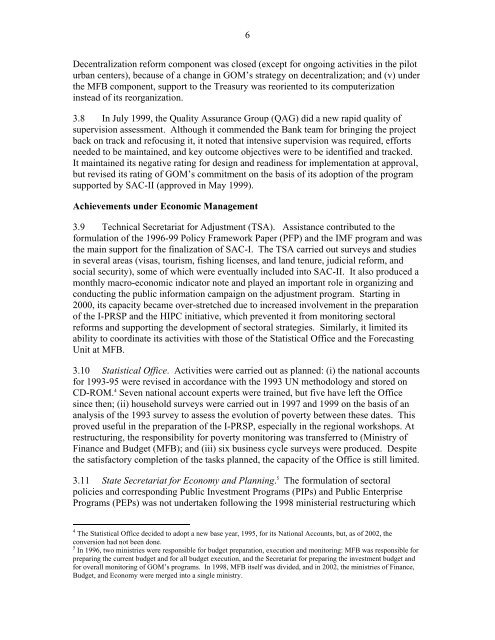Download Report - Independent Evaluation Group - World Bank
Download Report - Independent Evaluation Group - World Bank
Download Report - Independent Evaluation Group - World Bank
You also want an ePaper? Increase the reach of your titles
YUMPU automatically turns print PDFs into web optimized ePapers that Google loves.
6Decentralization reform component was closed (except for ongoing activities in the piloturban centers), because of a change in GOM’s strategy on decentralization; and (v) underthe MFB component, support to the Treasury was reoriented to its computerizationinstead of its reorganization.3.8 In July 1999, the Quality Assurance <strong>Group</strong> (QAG) did a new rapid quality ofsupervision assessment. Although it commended the <strong>Bank</strong> team for bringing the projectback on track and refocusing it, it noted that intensive supervision was required, effortsneeded to be maintained, and key outcome objectives were to be identified and tracked.It maintained its negative rating for design and readiness for implementation at approval,but revised its rating of GOM’s commitment on the basis of its adoption of the programsupported by SAC-II (approved in May 1999).Achievements under Economic Management3.9 Technical Secretariat for Adjustment (TSA). Assistance contributed to theformulation of the 1996-99 Policy Framework Paper (PFP) and the IMF program and wasthe main support for the finalization of SAC-I. The TSA carried out surveys and studiesin several areas (visas, tourism, fishing licenses, and land tenure, judicial reform, andsocial security), some of which were eventually included into SAC-II. It also produced amonthly macro-economic indicator note and played an important role in organizing andconducting the public information campaign on the adjustment program. Starting in2000, its capacity became over-stretched due to increased involvement in the preparationof the I-PRSP and the HIPC initiative, which prevented it from monitoring sectoralreforms and supporting the development of sectoral strategies. Similarly, it limited itsability to coordinate its activities with those of the Statistical Office and the ForecastingUnit at MFB.3.10 Statistical Office. Activities were carried out as planned: (i) the national accountsfor 1993-95 were revised in accordance with the 1993 UN methodology and stored onCD-ROM. 4 Seven national account experts were trained, but five have left the Officesince then; (ii) household surveys were carried out in 1997 and 1999 on the basis of ananalysis of the 1993 survey to assess the evolution of poverty between these dates. Thisproved useful in the preparation of the I-PRSP, especially in the regional workshops. Atrestructuring, the responsibility for poverty monitoring was transferred to (Ministry ofFinance and Budget (MFB); and (iii) six business cycle surveys were produced. Despitethe satisfactory completion of the tasks planned, the capacity of the Office is still limited.3.11 State Secretariat for Economy and Planning. 5 The formulation of sectoralpolicies and corresponding Public Investment Programs (PIPs) and Public EnterprisePrograms (PEPs) was not undertaken following the 1998 ministerial restructuring which4 The Statistical Office decided to adopt a new base year, 1995, for its National Accounts, but, as of 2002, theconversion had not been done.5 In 1996, two ministries were responsible for budget preparation, execution and monitoring: MFB was responsible forpreparing the current budget and for all budget execution, and the Secretariat for preparing the investment budget andfor overall monitoring of GOM’s programs. In 1998, MFB itself was divided, and in 2002, the ministries of Finance,Budget, and Economy were merged into a single ministry.
















